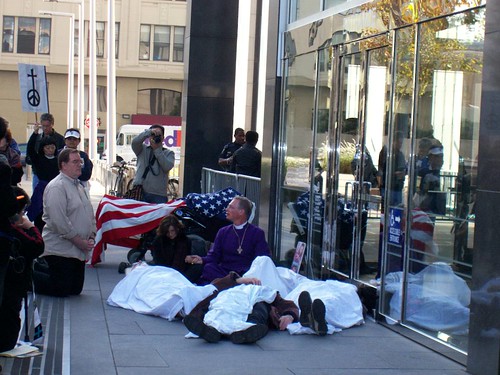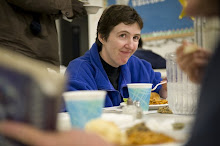William Stringfellow, Racism, and the Primates' Communique
This is a paper I wrote for a special reading course I'm doing with three other students and John Kater. I've been thinking about the goings-on in the Anglican Communion and the Episcopal Church, and wondering how to express my response coherently. This paper has been my clearest answer.
What is obedience to the gospel? Where are the churches in the struggle for justice? What are we to do when confronted by questions of human rights? What did Jesus do? Free in Obedience wrestles us through these questions.
The churches, writes Stringfellow, simply do not get it. He begins with an indictment of the churches, for being too much like their urban environments. The city, he writes, “is the frontier for the Church in American society.” (18) We have become so urbanized, that it must be so. Nearly half the population (in 1964) lived in cities. (19) Even rural dwellers are affected by urban culture.
But the cities are “profoundly decadent;” (20) even more, they are “places of death.” (31) Mission in the city, for the churches, means “a radical intimacy with every corner and every echelon of the city’s actual life.” (22) Witnessed by a governor seeking opinions on proposed legislation, who wrote a former bishop several years dead, the churches have been “hiding out.” (21) The churches do not know the cities well enough even to begin to serve the people within them. They have “abandoned” the gospel. (27)
Furthermore, the churches have celebrated false triumph. Fixated on Palm Sunday (31-47 passim), they ignore the true triumph of Easter. (34) God builds the “City of Salvation” (32); we are not even aware of it. In out attempt to avoid the sufferings of the cross, we yearn for the political triumph of Palm Sunday. (35) Christ gave his life for the saving of the world. We are called to do the same. This is true freedom. Our personal resources: money, time, training, class status, and everything else we have, are “sacraments of the gifts of [our] own lives.” (39) We are called to witness to Christ’s power in the world, first by being present. The most important thing is “the announcement of God’s love, and the freedom which that love gives people to love each other.” (42)
Stringfellow follows with a long discussion of principalities and powers. He defines them thus: “What the Bible calls ‘principalities and powers’ are called in contemporary language ‘ideologies,’ ‘institutions’, and ‘images.’” (52) They are not intrinsically evil; they are “living realities… made by God for [God’s] own pleasure," given to the dominion of humankind. They can be celebrity personae, institutions such as corporations, schools, or churches, or ideologies such as communism, humanism, or democracy. Money is a principality; so is religion. (53-59) Each makes a claim on human loyalty; all conflict and compete with each other. (60) When they fall short of God’s intention, they become demonic. (62) We, in our fallenness, idolize the principalities; this is Stringfellow’s description of filling the “God-shaped hole” in our hearts. The search, of course, is futile. (63) Principalities, be they wealth, possessions, or social status, are “powers of death.” (64)
Reading Stringfellow’s exposition of the principality of racism, I was struck deeply by the parallels to the recent Primates’ Communique. Writing in 1963, Stringfellow states, “To no principality—unless it be to those of commerce and finance…have the American churches been more notoriously and scandalously and complacently accommodating than to the principality of racism.” (77) Congregations which practice or support segregation, Stringfellow contends, “[fail] to treat conscientiously the meaning of baptism as the sacrament of the unity of all people in Christ.” They also “represent a surrender to the principality of racism,” (78) in effect choosing human prejudice and blindness over law, Church, and God. All this while remaining, on the face of it, nice people. (78-79) Stringfellow traces history back to the 1930s, looking for clear, coherent, prophetic statements against racism from the churches. He finds, in his words, “empty promises.” (79) By their silence, he indicts them as “handmaidens of the principality of racism, for… racism is as well served by appeasement as by idolatry.” (79)
In the face of revolt, in the 1960s, white people took notice. Clergy began demonstrating; “church budgets were loosened” to support the civil rights movement. (80) People started asking, “What do the Negroes want?”, not realizing the condescension evident in that question. White people were still motivated not by compassion, but by the desire to maintain control. (80) The churches, Stringfellow maintains, are “deeply and terribly… compromised in many instances and places to the principalities which rule American society….” (81)
Reading the Primates’ Communique, the Schedule of Recommendations set forth by the primates to enforce this, and Bishop Katharine’s call for a “season of fasting,” it appears to me that the church remains so compromised, both locally and globally.
The primates object to the precedent set in the Episcopal Church by ordaining an openly gay bishop. They object to the possibility of blessed civil unions. They hold up the non-binding Resolution 1:10 of the Windsor Report as the Anglican “standard of teaching.” (Communique, paragraph 11). That would be tolerable; we can’t expect to be of one mind with every other culture in the world that has an Anglican element. They overstep when they attempt to enforce their views. By attempting to enforce the moratoriums set forth in the Windsor Report (Communique, note 6) they not only try to legislate homophobia, but they become in polity what this body has never been. The Communique contains a veiled threat to the participation of the Episcopal Church (“On Clarifying the Response to Windsor”); the Schedule of Recommendations states that the proposed schemes are “intended to have force.” (Schedule, “Foundations”) They give the Episcopal Church a deadline which is irrespective of our polity. And they do this with the apparent support of our Presiding Bishop. While pointing out the parallel between this current issue and the history of slavery, she claims, “God’s justice is tempered with mercy.” She states that “a season of fasting” is asked of both parties—the Episcopal Church from recognizing the full humanity of GLBT people, and the conservatives at home and abroad from breaching diocesan boundaries.
I understand Bishop Katharine’s position, as well as a layperson can—she wants to stay in this conversation, and is willing to make concessions to do so. My visceral response is less sympathetic. How can people be asked to fast from justice? How can someone fast, who has never had enough food, simply because they love someone of the same gender? We promise to “respect the dignity of every human being.” How are these statements evidence of anything but the contrary?
I am tempted to believe that William Stringfellow would agree with me. He reminds us of Christ’s clash with the principalities of his time. He “stills the tempest, heals the sick, frees the demoniac, upsets the traditions of Israel by eating with sinners….” (71) He does not flinch even from physical death, and he is victor over all. “His victory is not for himself, but for us. This power [over death] is effective in the times and places in the daily lives of [people] when they are so gravely and relentlessly assailed by the claims of principalities for an idolatry which, in spite of all disguises, really surrenders to death as the reigning presence of the world.” (72) We need not be anxious, for in, through, and because of Christ, we too will live. (73)
We are called to be involved, to be present, to live the Gospel, and to choose justice. Neither we nor the Church need fear; we are “born into freedom from death.” (102) Perhaps the strongest statement of this book follows: “Whenever you regard another human being as less than yourself, you convict yourself of killing him.” (112) We belong to God. Obedience means not seeking our own preservation, but celebrating God’s involvement in the world, and joining in.






